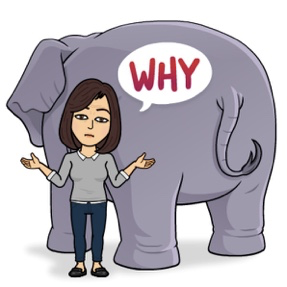Stories tend to become true. So start predicting the future you want to see, not the future you’re afraid of.

You want some evidence on how stories can create the future? Let’s look at the economy for a minute. We tend to believe that the economy is about numbers, and economic indicators. It’s not emotional. It’s rational and logical. But the truth is, we’re wrong.
The economy is a story we tell, just like any other one. But it’s a story with very real consequences.
The stock market crashed in 1929 because people were afraid the stock market was going to crash, and started selling selling selling. It always struck me, when I first learned about the crash, that the crash came after the panic, not before it. We didn’t panic because the market crashed. The market crashed because we panicked.
This doesn’t mean, of course, that the economic forces weren’t real. But it was the human reaction to it, beginning with predictions that the market was about to crash, that created the devastating events of that particular day.
You see the same factors at work today, in the economy, in all kinds of ways.
In the week before the election of 2016, Democrats thought the economy was pretty good, and Republicans thought it was pretty awful. A week *after* the election, the ratio flipped completely: Republicans thought the economy was pretty good, and Democrats thought it was awful.
Obviously, the only thing that changed during that week was the story we were telling ourselves. Republicans, flush from an unexpected victory, were confident and optimistic. Democrats, reeling from a devastating loss, were angry and despairing.
But the economy was neither of those things. The economy was just as it had been the week before.
Only the story changed.
This is not a new phenomenon. Our brains are designed to respond to emotions and beliefs over facts. It’s evolution’s strategy for making us pay attention to things that really matter: if our emotions are triggered, if we sense danger, our brain lights up like a meteor shower. The stronger the emotion, the stronger the signal. And herein lies the problem.
As Jonathan Chaidt has noted, our emotions are like elephants: huge and powerful and likely to stampede without good reason. Which means that we have to pay careful attention and ask ourselves:
Is this really true? Or is this the elephant stampeding?

Jonathan Chaidt suggests that our emotions are like an elephant: powerful and prone to do whatever they want, whether or not it’s rational. We have a tendency to make up “elephant” stories — stories that might not be true, but still can have a dramatic impact.
The consequences are pretty dire. Stampeding elephants can start a war.
For instance, let’s tell a story about rural Americans. They’re living in an uncertain time. The world is changing faster than they like. There are a lot of immigrants coming in from other countries, and rural Americans feel isolated and surrounded. They start talking to each other, worrying together. They become obsessed with thinking that the immigrants and some of these other groups are conspiring. They think a takeover is imminent. They figure, we better arm ourselves. We better take action now, before they hunt us down!
I am describing the origins of the French Indian War.
Americans became convinced that the French and the Indians had joined forces to take down the Americans. But here’s the thing: that wasn’t true. It was just a story, a stampeding elephant.
The stampeding elephant is not a new phenomenon. I suspect, in the era of social media, it might be easier to trigger than it used to be. But we’re not helpless, in the face of the elephant. We do have the ability to recognize and ask ourselves two things:
1. Is this true? Or is this just a story I’m telling myself?
Human beings are “meaning makers.” It’s one of the main reasons that we have succeeded and thrived as a species: we have the ability to put together facts that could be random, and create meaning out of them. But there’s a downside. Our brains are naturally designed to put together “bad stories”. There was a fascinating bit of research that showed if there are three people in a room, and two people whisper, the third person will assume they are saying something bad about him.
From a neurological standpoint, this makes sense. When we were living in caves, or in tiny communities in the woods, we had to be able to recognize danger quickly, to guard against it. So our brains were constantly on the lookout for facts that, when put together, might indicate trouble.
But in this day and age, when we are bombarded by facts and information constantly, it is way too easy to find danger where there isn’t any. We have to stay aware of the difference between what is true and what is a story.
So the trick is to stay vigilant, and constantly ask yourself: is this true? Or is this just a story I’m telling?
And even more than that: what story is the best story for me to tell?
2. Stories tend to become true. So start predicting the future you want to see, not the future you’re afraid of.
Here’s the other thing to remember. As the French Indian War experience shows, storytelling has an incredible power insofar as the stories we tell tend to become true. There has been research upon research upon research proving this fact.
And this is the real danger. It’s why Steven Pinker wrote a gigantic book, Enlightenment Now, basically begging us to stop telling terrible stories about the world. His thesis was pretty simple: the world is *not*going in the wrong direction. Whether you’re measuring by violence or equality or democracy or mortality, statistics show that we are better off today than we ever have been in the history of humanity.
Steven Pinker is begging us to stop saying the world is getting worse because he knows: if we keep telling that story, even though it’s false, we’ll make it come true.
But if we keep saying that the world is getting worse, we will make it so. If we pull out of the Iran deal because we think it’s not working, we will guarantee it doesn’t work. If we stop investing in a global economy because we think it’s bad for America, then America will be harmed. If we stop investing in research because we think it’s not solving important problems, then important problems won’t be solved.
It’s human nature, predictable as the sun. If you think the two people across the table are whispering about you, you’ll start to act suspicious. You’ll withdraw. You’ll get angry. And pretty soon, they will be whispering about you.
One of my favorite weird bits of research is the Pygmalion effect, which shows that people tend to become what we believe them to be. It showed, for instance, that teachers’ opinions of students tend to affect students’ behavior, even when the students’ don’t hear the opinions directly. Same with employees and employers. This can be true in a positive or negative sense. The research on teachers showed that when teachers made a practice of thinking positively about their students, with no other intervention and measured against a control group, the students tended to perform better.
The stories we tell become true. It’s why I get upset when I hear pundits talking about who’s definitely going to win an election in 2020, or what’s likely going to happen in the next few years. Because every time we tell a negative story, about ourselves or our communities or the world at large, research shows: we make that story more likely to come true.
It’s why I get upset when I hear pundits talking about who’s definitely going to win an election in 2020, or what’s likely going to happen in the next few years. Because every time we tell a negative story, about ourselves or our communities or the world at large, research shows: we make that story more likely to come true.
So think very carefully about the story you’re telling: in your social media, to your friends, even the story inside your own brain.
Because you have more power than you can possibly imagine, and the story that you tell is likely to become true.



